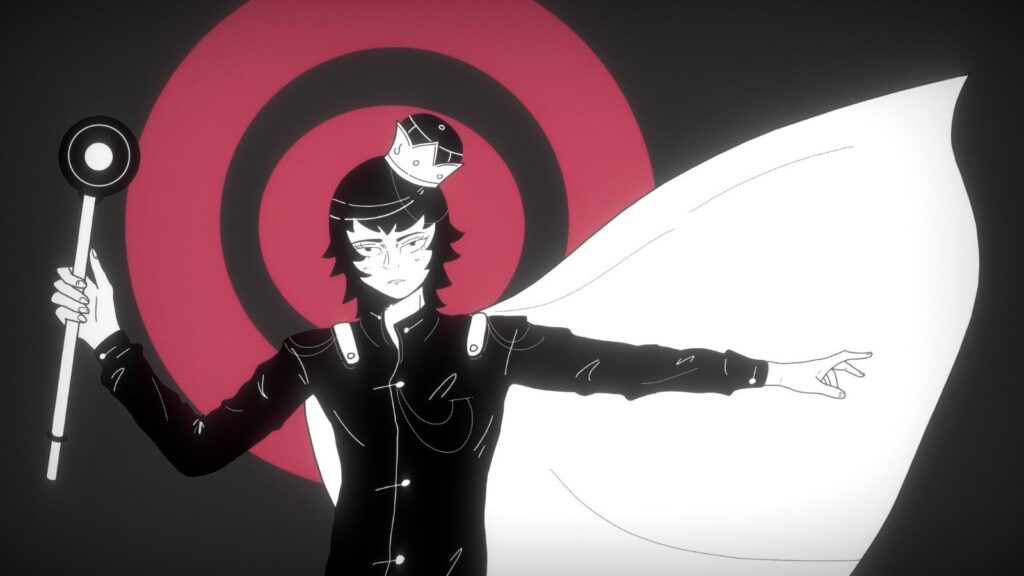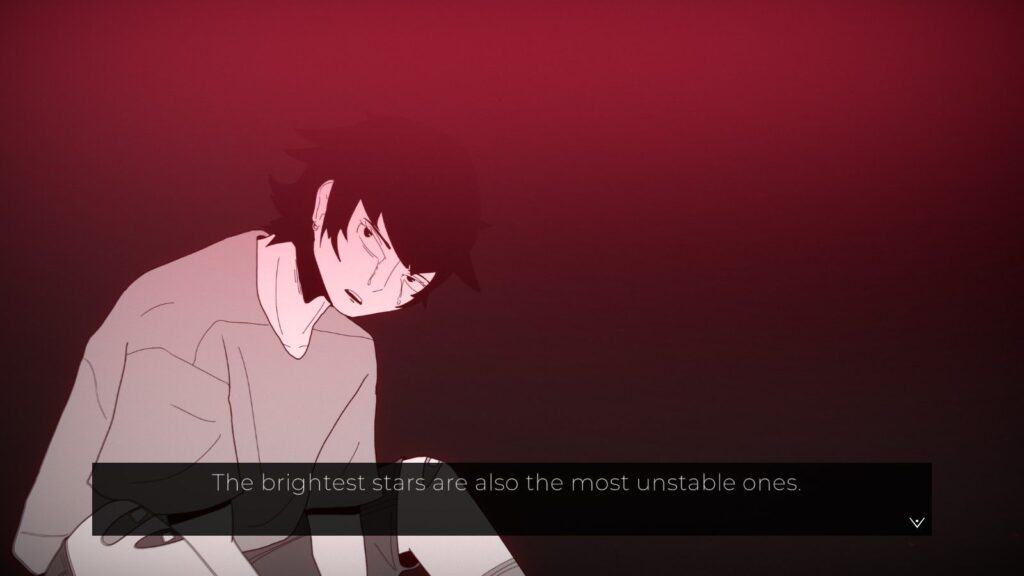
Milky Way Prince – The Vampire Star conveys the horror of an unstable relationship
Content warning for Milky Way Prince – The Vampire Star: discussion of abuse.
The first time I played a demo version of queer visual novel Milky Way Prince – The Vampire Star I was at the Game Happens festival in Genoa, in 2019 (back when we still had physical festivals). I thought it was visually stunning: it mixes 3D environments with highly stylized 2D anime characters and elegant UI elements that are at the same time minimalist and almost esoteric. A strong debut for a young developer like Lorenzo Redaelli who wrote, programmed, illustrated and scored Milky Way Prince (published by Italian cult studio Santa Ragione). But I wasn’t sure a game like that should have existed at all.
Nuki, Milky Way Prince’s protagonist, is a young man with “stars in his eyes.” He likes astronomy, he plays piano, he has a starfish as a pet. One day he follows a shooting star, a meteor that falls in the city where he lives, but at the impact site he doesn’t find a crater: he finds another boy, Sune. Sune is melancholic, mysterious and charming and he reminds Nuki of the main character of the “Milky Way Prince” fairy tale he loves. There’s a instant chemistry between the two boys, and after maybe a couple of hours they are having sex in a bathroom. Milky Way Prince follows their brief, painful and dysfunctional relationship, complicated by the fact that Sune is a “vampire star,” an unstable astronomical object that could devour the protagonist.
It’s not a mere optional second level of interpretation: in Milky Way Prince natural and supernatural coexist and Sune is both a real person (he has a past, an ex-boyfriend, a job) and a star that has just plummeted from the sky. In a similar way, environments are both real, functional spaces and geometrical abstractions where BDSM toys are represented as sci-fi technologies designed to torture enormous spheres of plasma. Even sex is steeped in stellar symbolism: it’s a gravitational force that feeds Sune’s vampire star with Nuki’s starred-eyes, a transfer of matter between celestial bodies, but, at the same time, it’s a carnal exchange of bodily fluids. While other games represents sex focusing on its audiovisual elements, Milky Way Prince depicts it as a total sensorial experience indeed: sex is colors, sounds, smells, flavours and textures, and players can even choose which senses they want to prioritize during each sexual intercourse.

In this short game (a single playthrough lasts 1.5 hours) everything works towards a fragmented, slow-paced, dream-like (sometimes, lynchian and horror) atmosphere. Playing it is often a hassle, and that’s the point: it’s not meant to be fun and to let us dictate its rhythm. Redaelli uses the traditional mechanics of the visual novel genre (its branching dialogues, its choices, its multiple endings) to deliver feelings of illusion of control, lack of agency, unpredictability of the consequences of our actions. That’s because Milky Way Prince is a partially autobiographical story, and it’s based on Redaelli’s past experience in an abusive relationship with a partner living with borderline personality disorder. A bright but unstable and vampire-like star.
It works, and it was painfully relatable to me, because my partner also lives with a mental disorder. I’m not saying that I completely understand Redaelli’s experience, because his story is personal and unique and my relationship is stable and not abusive at all: I don’t know anything about the psychological manipulation he suffered and that he describes in the game. But my partner’s mental condition has overlapping symptoms with borderline personality disorder and I think Milky Way Prince shows something even more common (above all, in the LGBTQ+ community) but rarely discussed: it shows how living with someone with a chronic mental disorder is.
I recognized many of Milky Way Prince‘s images and details: becoming part of “a binary system” (two stars orbiting around a common center), not knowing if you should be as violent as your partner asks during sex, feeling like your energies are being drained to sustain another life… And that’s why I initially rejected the game: I thought video games shouldn’t deal with this topic, I thought that no one should say that sometimes living with someone who suffers is hard, sad and exhausting. I was ashamed of these thoughts and I didn’t want to discuss them. Playing Milky Way Prince, I grew grateful for the existence of this game: I really needed to see these feelings represented and depicted as valid, I really needed to think that maybe talking about them is fine, even necessary.
Milky Way Prince – The Vampire Star is available for PC and Mac on Steam.




